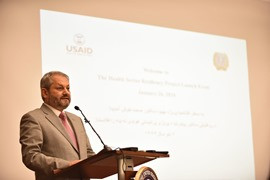
For Immediate Release
Kabul, Afghanistan – The United States Agency for International Development (USAID) and the Ministry of Public Health announced a partnership that will enable the Afghan government to better identify local revenue streams in order to provide sustainable, affordable health services to its citizens.
The new five-year, $37.9 million Health Sector Resiliency (HSR) Project funded by USAID will help the Ministry of Public Health foster a strengthened, reformed, and increasingly self-reliant Afghan health system. The project primarily focuses on management, finance, and human resources for health.
Afghanistan has made remarkable achievements over the last 14 years in expanding access to health care services, which are now accessible even to communities in highly difficult terrain. Government funding for healthcare is low, and Afghan families are burdened with paying high out-of-pocket costs for services. Due to variations in quality and standards, Afghan families also spend up to $285 million annually for health care abroad.
U.S. Ambassador P. Michael McKinley said during a ceremony to launch the HSR project that financing health services has the political support and engagement from the U.S. government and the National Unity Government through multiple ministries. Sector-wide reforms are required to achieve a viable healthcare financing solution.
“The United States is strongly committed to working with Afghanistan to promote a sustainable healthcare financing solution,” McKinley said. “To achieve sustainable access to affordable health services for all Afghans we must broaden the conversation beyond the Ministry of Health to include all other relevant ministries and the Parliament.
Minister of Public Health Ferozuddin Feroz said good governance and strong stewardship are critical to improving the quality of health services, increasing revenue generation, and maximizing efficient use of resources.
“We will not be able to become more independent and move towards an Afghan-supported health system without this critical partnership with other government entities,” Feroz said. “I am very confident that with our joint efforts, we will transform the health system into a stronger and more resilient health system.”
Also in attendance at the launch were Minister of Finance Eklil Hakimi, Minister of Justice Abdul Basir Anwar, Minister of Economy Abdul Satar Murad, Minister of Women’s Affairs Dilbar Nazari, and Naqeebullah Fayeq, head of the Parliament Health Committee.
USAID’s interventions in the health sector in Afghanistan emphasize Afghan leadership and management to meet the immediate health needs of the Afghan people, especially women and children, as well as to strengthen government capacity to better manage delivery of those services.







Comment
Make a general inquiry or suggest an improvement.